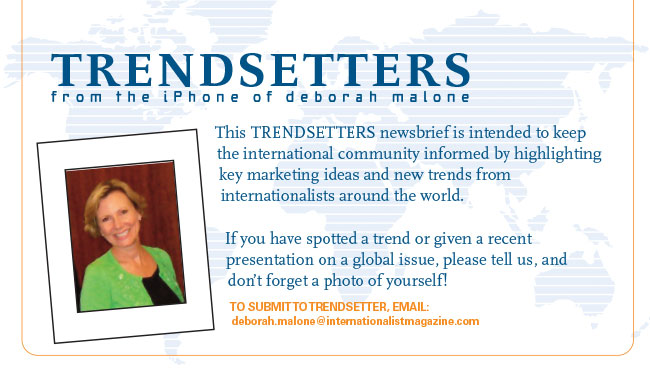
Trendsetters: Mondelēz International’s Bonin Bough Offers New Rallying Cry to Marketers

Bonin Bough, Vice President of Global Media and Consumer Engagement at Mondelēz International
To say that Bonin Bough is a facile thinker and passionate communicator just might be an understatement. As Vice President of Global Media and Consumer Engagement at Mondelēz International, he’s also become an industry evangelist—a role he didn’t seek, but one that seems to suit him quite naturally.
Speaking this Sunday at the ANA’s Digital Conference in Southern California, he rallied a marketer audience by telling them “to create value by breaking things.” He calls this new way of thinking “Hackonomy,” and advocates that the brand marketing community should take the best of technology’s “hacking” culture or programmatic problem solving to better espouse a development mindset. He encouraged marketers to think more like startups, get out of their comfort zone, experiment in real time, and constantly “break things apart” to see new ways to create value faster and be part of a new generation of leadership.
A global thinker and an obvious enthusiast of technology and contemporary culture, Bonin Bough has the rare ability to see ahead, look to the past, draw conclusions quickly, and take risks—all while staying rooted with a sense of humor and humility. His thoughts on key industry issues also bravely evolve, but his dedication to the new is unwavering—whether it’s his early talks on digital fitness and corporate dinosaurs, PepsiCo10 and the next wave of digital talent, views on SXSW as a marketplace for brands, or Super Bowl marketing magic via Oreo’s #DunkInTheDark. He combines his exuberance as a champion among the brand teams within Mondelēz with the vision of an up-to-the-minute industry trailblazer.
His ANA talk focused on two areas: changing today’s marketing mindset and an expanded commitment to mobile. At the heart of both topics is his belief in operating at the speed of culture to drive both consumer connections and increased value—which underscores his Hackonomy concept and how we must continually reinvent ourselves and our organizations.
Bonin Bough recognizes that new organizations—no matter the industry or the geography-- are creating value faster than ever before. The comparison of these companies with long-established, big organizations is dizzying, particularly when considering the valuations and sale prices of these innovative (largely tech-based) businesses, along with their short existence and scant number of employees. In the process, though, companies ranging from Amazon to Facebook to Uber to Airbnb and now OpenAirplane, as just a handful of examples, have revolutionized our concepts of not only traditional businesses, but entire industries.
Bonin is convinced that their “hacker way” of creating culture and approaching the world makes a significant difference-- one that marketers should consider as they move their companies forward, and as they evaluate talent and make leadership decisions. He recommends that we hack or break apart our current careers so we can rebuild them better and be part of the next generation.
Early movers, particularly in marketing, can build the capability and muscle memory to change their businesses. He cites the transition from radio to television, and underscores how companies like Procter & Gamble embraced a new medium at that time with great success.
Today, he sees similar possibilities with mobile. People of spending 24% of their media time on mobile, yet it only receives 1% of advertising expenditure. Bonin jokes about industry experts who question whether mobile is truly at scale. He notes that in a world of 7 billion people, 5.1 billion own a phone, while 4.2 billion own a toothbrush. Mondelēz is making a commitment to the medium with a plan to shift 10% of their budget to mobility.
Interestingly, Mondelēz’s experimentation with mobile is already breaking new ground—and it began by thinking differently about brand assets while using media and creativity in new ways. Oreo, with the help of digital game creator PikPok from New Zealand, has built a mobile game based on the cookie’s “twist, lick, dunk” tagline. Not only is the game the most downloaded app in 12 countries, it is cash positive—meaning the game is now built around media monetization tied to its engaging content.
Perhaps the concept of selling virtual cookies may seem far-reaching for a snack foods company. However games and mobile apps can create long-term engagement when customers play repeatedly. And a brand like Oreo can continually interact with these players and reward them for loyalty.
Oreo’s “Trending Vending Lounge” at SXSW provided a customized consumer experience based on trending Twitter conversations. Oreo’s vending machines used 3D printing technology and the hashtag #eatthetweet to create edible cookies in less than 2 minutes. Enthusiastic techno-snackers were happy to wait two hours to choose from a variety of wafer and cream selections and watch the creation of their personal cookie.
According to Bonin Bough, “Experimentation spawns different thinking in the culture. Now one of our food scientists is determined to create a potential mass customization business.”
In closing, he transformed computer scientist Alan Kay’s famous quote, “The best way to predict the future is to invent it,” by suggesting that “The best way to predict the future is to hack it.”
Interestingly, Alan Kay also said, “If you don’t fail at least 90 percent of the time, you’re not aiming high enough.” Bonin Bough, no doubt, would agree.
